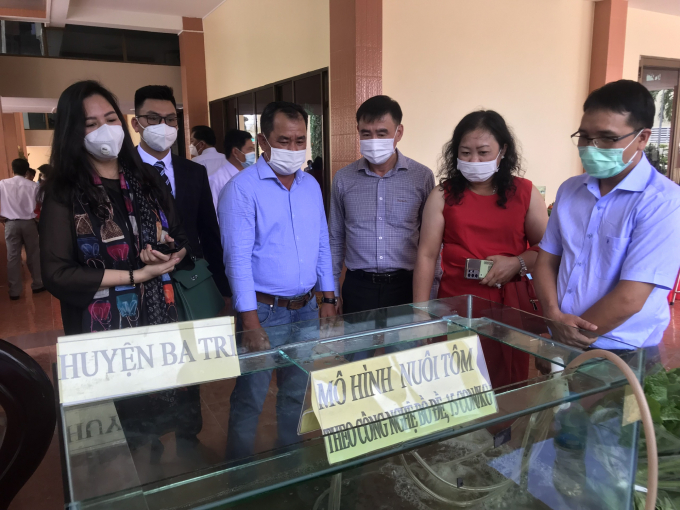November 21, 2025 | 01:19 GMT +7
November 21, 2025 | 01:19 GMT +7
Hotline: 0913.378.918
November 21, 2025 | 01:19 GMT +7
Hotline: 0913.378.918

Mr. Tran Van Vu (left) is a great farmer and also a member of Ben Tre Billionaire Farmers Club. Photo: Minh Dam.
Mr. Tran Van Vu in An Binh Tay commune, Ba Tri district, Ben Tre, is referred to as a great farmer in terms of production and business. His recent approach of tarpaulin and non-tarpaulin shrimp farming models according to the biological process transferred by Bo De Group has brought him great success, helping him earn billions of VND every year.
Mr. Vu's family currently owns 30 high-density brackish water shrimp ponds. In which, 15 ponds have tarpaulin lined completely and 15 ponds have tarpaulin lined at the edge. The average output is 4 tons/1,000m2/crop. Last year the total production of the farms reached approximately 200 tons. Although statistics have yet been summarized, after deducting investments, the family earned a profit of approximately VND 5 billion in 2021.
As for the success factor in the profession, he revealed: "If 10 years ago when mentioning the first success factor in shrimp farming, breed stand above farming environment, then in the recent 10 years farming environment has become the most important prerequisite factor that largely determines the success or failure of a shrimp crop."

Businesses visit Mr. Vu’s biotech shrimp model at the 2nd Ben Tre Excellent Farmers Honoring Ceremony. Photo: Minh Dam.
To improve the overall farming environment, Mr. Vu chose to apply 100% of Bo De Group’s biological process. The product Bo De Mother Water which he uses to treat pond water also improves the soil without being poisoned with alum and other chemicals. This creates conditions for the shrimp’s natural food of shrimp such as algae and worms to develop. Thanks to that, the shrimp grow fast and attain good resistance. Farmers do not have to use too many antibiotics and drugs, thus reducing feed cost ratio and investment expenses.
Mr. Vu said that when he had not used Bo De Mother Water biological product, the water environment in the pond was very unstable and difficult to manage. Shrimp growing rate was not high due to diseases. Despite huge investment costs for food and drugs to prevent and treat diseases, the crop constantly lacked sustainability and earned little profit. He confided, “There were times when I was very disheartened. I even wanted to withdraw from the shrimp industry.”

Ms. Nguyen Thi Hang, Chairman of the Board of Directors and General Director of Bo De Group introducing Mr. Tran Van Vu's farmed shrimps. Photo: Minh Dam.
But three years ago, by pure coincidence he had the opportunity to participate in a training course of the provincial Farmers' Union, Department of Agriculture and Rural Development collaborating with Bo De Group. The units were implementing the Farmer Professionalization Program by providing training sessions and transferring technologies to local farmers. Since then, he gained access to shrimp farming science, technology and biological process transferred by Bo De Group.
“The shrimps in my ponds three years ago were not as large and uniform in size as it is today. Bo De Group’s biological process has helped shrimp batches to reach the size of 30 - 20 - 15 shrimp/kg uniformly, all following my wishes. The post-crop water environment does not cause pollution. And as for the non-tarpaulin ponds, the bottom soil is improved at an increasing rate. Alum, organic, and inorganic poisons gradually cease to exist.”

Mr. Vu is filled with excitement upon the results after applying the biotech shrimp farming process of Bo De Group. Photo: Minh Dam.
Sharing about the use of Bo De Mother Water, Ms. Nguyen Thi Hang, Chairman of the Board of Directors and General Director of Bo De Group said:
"When the product is added to the feed, shrimps will help digest better, thereby reducing the feed cost ratio during the farming process. The waste does not contaminate the water environment. The product also supplements bio-organic minerals for shrimps and fishes through the digestive system and eliminates antibiotic residues.
"And when splashed on the ground and water Bo De Mother Water will help improve the pond bottom, eliminate alum, chemical and organic poisons and improve salinity and pH balance, and increase the oxygen level. Natural food such as algae and worms can flourish at the pond bottom which serves as food for shrimp."
Translated by Samuel Pham

(VAN) This is the study conducted by IRRI and Can Tho University on the rice straw value chain in Mekong Delta showing an economic potential of more than 6.6 trillion VND/year.

(VAN) By participating in cooperative economics, many farmers in Tay Ninh have overcome hardship, mastered clean dragon fruit cultivation techniques.

(VAN) The crossbreeding program in the former Binh Dinh province (now part of Gia Lai) has shown signs of decline, and urgent measures are needed to revive it and sustain past achievements.

(VAN) The agricultural sector agreed on a roadmap to pilot the MRV protocol and expand low-emission rice production from the 2025-2026 winter-spring crop.

(VAN) Agricultural extension officers in Quang Ninh do more than transmit knowledge; they have become a steadfast support system for farmers on the path to sustainable agricultural development.

(VAN) The development of a high-quality beef cattle herd has brought major benefits to livestock farmers, creating jobs and enabling better use of agricultural by-products.

(VAN) In the eastern region of Gia Lai, crossbred cattle now account for 93%, forming a high-quality beef herd and establishing a recognized brand, the result of 35 years of persistent effort.